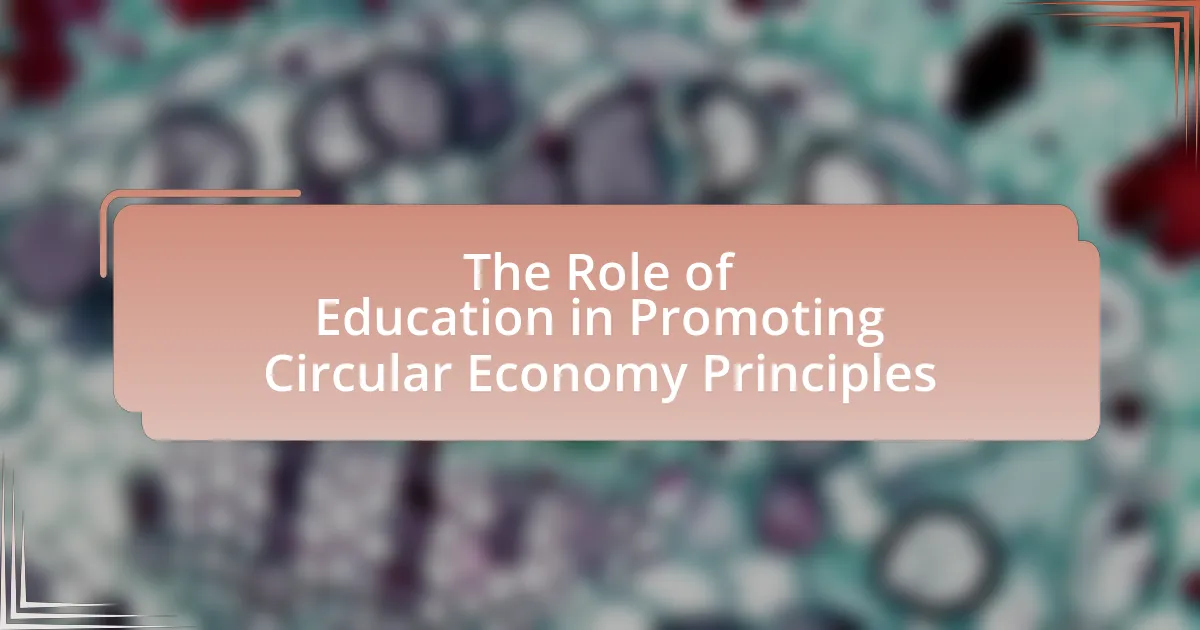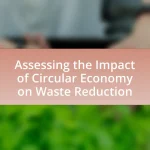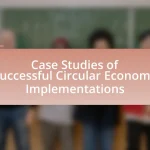The article examines the critical role of education in promoting circular economy principles, emphasizing how it equips individuals with the necessary knowledge and skills for sustainable practices. It highlights the importance of integrating concepts such as resource efficiency, waste reduction, and sustainable design into educational curricula, which fosters awareness and encourages innovative thinking among students. The article also discusses various educational approaches, including formal and informal methods, and the challenges faced in implementing these principles within existing educational frameworks. Additionally, it explores the impact of community engagement and partnerships between educational institutions and industries in advancing circular economy education.
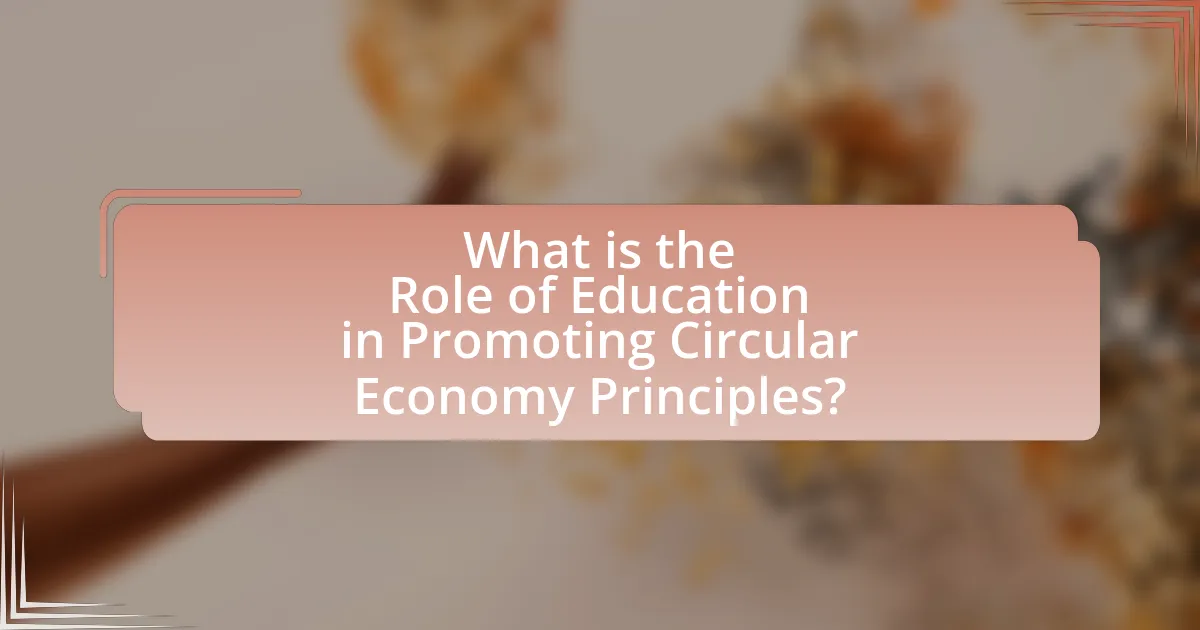
What is the Role of Education in Promoting Circular Economy Principles?
Education plays a crucial role in promoting circular economy principles by equipping individuals with the knowledge and skills necessary to understand and implement sustainable practices. Through formal and informal education, learners gain insights into resource efficiency, waste reduction, and sustainable design, which are fundamental to a circular economy. For instance, educational programs that focus on environmental science and sustainability have been shown to increase awareness and foster innovative thinking among students, leading to practical applications in various industries. Research indicates that countries with strong educational frameworks around sustainability report higher rates of circular economy adoption, demonstrating the direct impact of education on fostering a culture of sustainability and responsible consumption.
How does education influence the understanding of circular economy concepts?
Education significantly enhances the understanding of circular economy concepts by providing individuals with the knowledge and skills necessary to engage with sustainable practices. Through structured curricula, educational programs introduce key principles such as resource efficiency, waste reduction, and sustainable design, which are foundational to the circular economy. Research indicates that students exposed to these concepts are more likely to adopt sustainable behaviors and advocate for circular practices in their communities. For instance, a study published in the Journal of Cleaner Production found that educational interventions increased students’ awareness and understanding of circular economy principles, leading to a 30% increase in their intention to engage in sustainable practices. This evidence underscores the critical role education plays in shaping perceptions and fostering a culture of sustainability aligned with circular economy objectives.
What are the key principles of circular economy that education addresses?
Education addresses key principles of the circular economy, including resource efficiency, waste reduction, and sustainable design. These principles emphasize the importance of using resources more effectively, minimizing waste through recycling and reuse, and designing products with their entire lifecycle in mind. For instance, educational programs often incorporate case studies that illustrate successful circular economy practices, such as companies that have reduced material consumption by implementing closed-loop systems. This approach not only enhances students’ understanding of sustainability but also equips them with the skills necessary to innovate within a circular framework, thereby fostering a culture of sustainability in future industries.
How do educational programs incorporate sustainability into their curriculum?
Educational programs incorporate sustainability into their curriculum by integrating concepts of environmental stewardship, resource management, and social responsibility across various subjects. For instance, many institutions include sustainability-focused courses that cover topics such as renewable energy, waste reduction, and sustainable agriculture. Additionally, hands-on projects and community engagement initiatives are often employed to provide practical experience in sustainability practices. Research indicates that schools implementing sustainability education see increased student awareness and engagement in environmental issues, as evidenced by a study from the University of Illinois which found that students exposed to sustainability curricula demonstrated a 30% increase in environmentally responsible behaviors.
Why is education essential for fostering a circular economy?
Education is essential for fostering a circular economy because it equips individuals with the knowledge and skills necessary to understand and implement sustainable practices. By integrating concepts of resource efficiency, waste reduction, and sustainable design into educational curricula, learners can develop critical thinking and problem-solving abilities that are vital for transitioning to a circular economy. Research indicates that countries with strong educational frameworks focused on sustainability, such as Finland, have seen significant advancements in circular economy initiatives, demonstrating the direct impact of education on fostering innovative solutions and responsible consumption patterns.
What skills and knowledge does education provide for circular economy practices?
Education provides critical skills and knowledge for implementing circular economy practices, including systems thinking, sustainable design, and resource management. Systems thinking enables individuals to understand the interconnectedness of economic, environmental, and social systems, which is essential for developing sustainable solutions. Sustainable design principles teach how to create products and services that minimize waste and maximize resource efficiency. Resource management skills focus on optimizing the use of materials and energy, promoting recycling and reuse. These educational components are supported by research indicating that effective education in sustainability leads to increased awareness and adoption of circular economy practices, as evidenced by studies from institutions like the Ellen MacArthur Foundation, which highlight the importance of education in fostering innovative approaches to sustainability.
How does education contribute to changing consumer behavior towards sustainability?
Education significantly contributes to changing consumer behavior towards sustainability by increasing awareness and understanding of environmental issues. When individuals are educated about the impact of their consumption choices on the planet, they are more likely to adopt sustainable practices. For instance, studies show that consumers who receive education on sustainability are more inclined to purchase eco-friendly products and reduce waste. Research conducted by the United Nations Educational, Scientific and Cultural Organization (UNESCO) highlights that educational programs focused on sustainability lead to a measurable increase in pro-environmental behaviors among participants. This correlation demonstrates that education is a powerful tool in fostering a culture of sustainability among consumers.
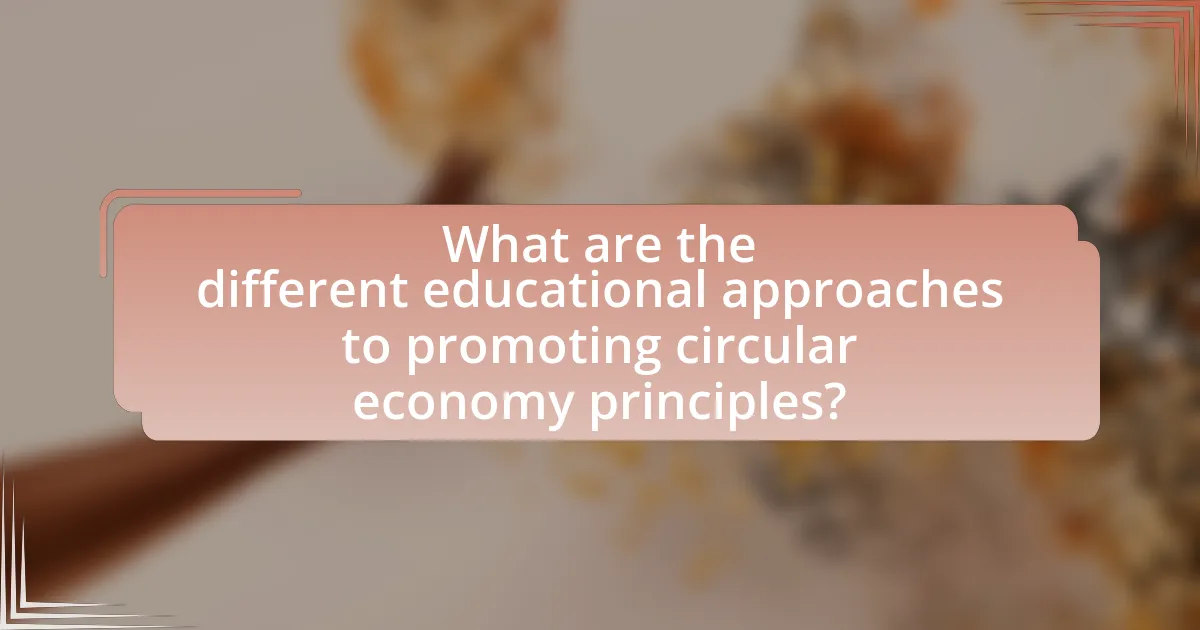
What are the different educational approaches to promoting circular economy principles?
Different educational approaches to promoting circular economy principles include experiential learning, interdisciplinary curricula, and community engagement initiatives. Experiential learning allows students to engage in hands-on projects that demonstrate circular economy concepts, such as waste reduction and resource efficiency. Interdisciplinary curricula integrate subjects like economics, environmental science, and design to provide a holistic understanding of circular systems. Community engagement initiatives involve partnerships with local businesses and organizations to implement circular practices, fostering real-world applications of theoretical knowledge. These approaches are supported by research indicating that active participation and collaboration enhance understanding and commitment to circular economy principles.
How do formal education systems integrate circular economy principles?
Formal education systems integrate circular economy principles by incorporating sustainability-focused curricula that emphasize resource efficiency, waste reduction, and systems thinking. These curricula often include interdisciplinary approaches that connect environmental science, economics, and social studies, enabling students to understand the interconnectedness of ecological and economic systems. For instance, programs may involve project-based learning where students engage in real-world challenges related to recycling, sustainable design, and renewable energy. Research from the Ellen MacArthur Foundation highlights that educational institutions adopting these principles can foster innovation and critical thinking, preparing students to contribute to a circular economy.
What role do universities play in advancing circular economy education?
Universities play a crucial role in advancing circular economy education by integrating sustainability principles into their curricula and research initiatives. They develop interdisciplinary programs that equip students with the knowledge and skills necessary to understand and implement circular economy practices. For instance, institutions like the Ellen MacArthur Foundation collaborate with universities to create educational resources and frameworks that promote circular economy concepts. Additionally, universities often engage in research projects that explore innovative solutions for waste reduction and resource efficiency, contributing to the broader discourse on sustainable development. This educational approach not only prepares future leaders but also fosters a culture of sustainability within communities.
How can primary and secondary education systems adapt to include circular economy concepts?
Primary and secondary education systems can adapt to include circular economy concepts by integrating sustainability-focused curricula that emphasize resource efficiency, waste reduction, and environmental stewardship. This can be achieved through project-based learning that involves real-world applications, such as recycling initiatives and community clean-up projects, which help students understand the practical implications of circular economy principles. Research indicates that educational programs incorporating sustainability can enhance students’ awareness and engagement; for instance, a study by the United Nations Educational, Scientific and Cultural Organization (UNESCO) found that schools implementing sustainability education saw a 30% increase in student participation in environmental activities. By fostering critical thinking and problem-solving skills related to circular economy practices, education systems can prepare students to contribute positively to sustainable development.
What informal educational methods support circular economy awareness?
Informal educational methods that support circular economy awareness include workshops, community projects, and experiential learning activities. Workshops provide hands-on experiences where participants can learn about sustainable practices and resource management. Community projects, such as local clean-up initiatives or recycling drives, engage individuals in practical applications of circular economy principles, fostering a sense of responsibility and collaboration. Experiential learning activities, like guided tours of recycling facilities or sustainable farms, allow participants to observe and understand the impact of circular economy practices in real-world settings. These methods effectively raise awareness by promoting active participation and real-life applications of circular economy concepts.
How do community workshops and seminars promote circular economy principles?
Community workshops and seminars promote circular economy principles by educating participants on sustainable practices and resource management. These events facilitate knowledge sharing, enabling individuals and organizations to understand the importance of reducing waste, reusing materials, and recycling. For instance, workshops often include hands-on activities that demonstrate how to repurpose items, thereby reinforcing the concept of a circular economy where products are kept in use for as long as possible. Research indicates that community engagement in such educational initiatives leads to increased awareness and adoption of circular practices, as evidenced by a study published in the Journal of Cleaner Production, which found that participants in workshops reported a 30% increase in sustainable behavior post-event.
What role do online platforms and resources play in educating about circular economy?
Online platforms and resources serve a crucial role in educating individuals and organizations about the circular economy by providing accessible information, tools, and community engagement opportunities. These platforms, such as educational websites, online courses, and social media, facilitate the dissemination of knowledge regarding sustainable practices, resource efficiency, and waste reduction strategies. For instance, the Ellen MacArthur Foundation offers extensive online resources that outline circular economy principles and case studies, helping users understand practical applications. Additionally, platforms like Coursera and edX provide courses on sustainability and circular economy, enabling learners to gain formal education on the subject. This widespread availability of information fosters awareness and encourages the adoption of circular economy practices across various sectors.
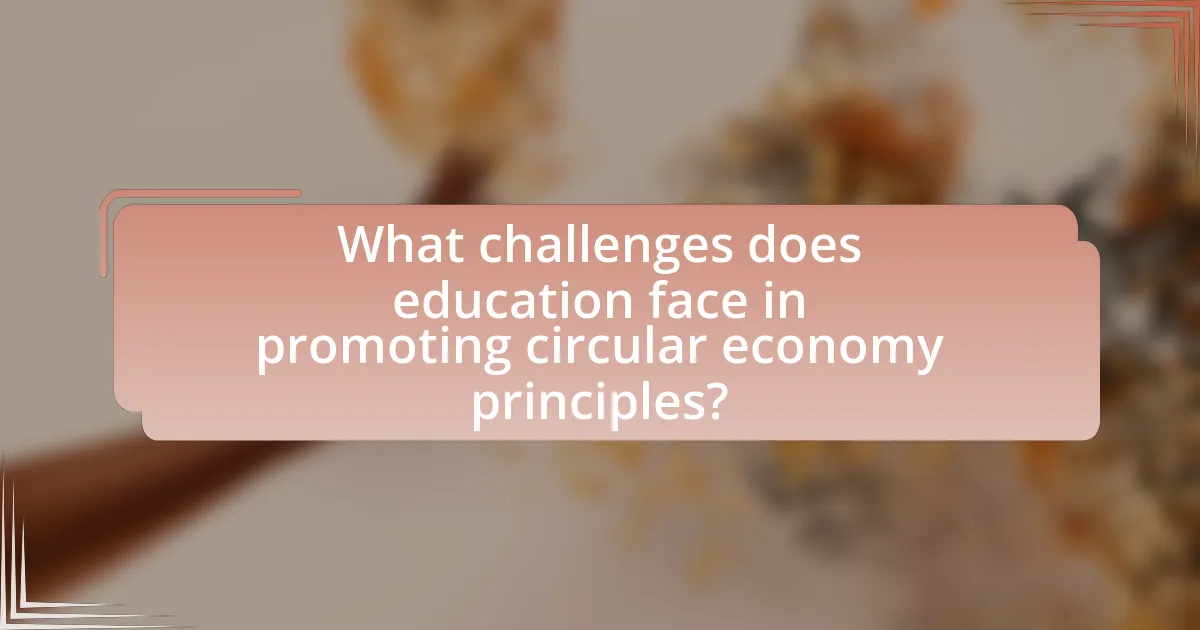
What challenges does education face in promoting circular economy principles?
Education faces significant challenges in promoting circular economy principles, primarily due to a lack of comprehensive curricula that integrate sustainability concepts. Many educational institutions do not prioritize circular economy topics, resulting in insufficient knowledge and awareness among students. Additionally, educators often lack training and resources to effectively teach these principles, which hinders their ability to convey the importance of sustainable practices. Research indicates that only 30% of universities worldwide incorporate sustainability into their curricula, highlighting the gap in education related to circular economy principles. Furthermore, there is often resistance to change within educational systems, as traditional linear economic models remain deeply entrenched in teaching methodologies.
What barriers exist in integrating circular economy concepts into existing curricula?
Barriers to integrating circular economy concepts into existing curricula include a lack of trained educators, insufficient resources, and resistance to change within educational institutions. The absence of educators who are knowledgeable about circular economy principles limits effective teaching, as highlighted by a study from the Ellen MacArthur Foundation, which emphasizes the need for specialized training. Additionally, many institutions face budget constraints that hinder the development of new materials and courses focused on circular economy. Resistance to change is often rooted in traditional educational frameworks that prioritize linear economic models, making it challenging to adopt innovative approaches.
How can educators overcome resistance to change in traditional educational frameworks?
Educators can overcome resistance to change in traditional educational frameworks by actively engaging stakeholders through transparent communication and collaborative decision-making. This approach fosters a sense of ownership and reduces apprehension towards new methodologies. Research indicates that involving teachers, students, and parents in the change process leads to higher acceptance rates; for instance, a study by Fullan (2007) emphasizes that successful educational reforms require stakeholder buy-in to ensure sustainability. Additionally, providing professional development opportunities equips educators with the necessary skills and confidence to implement new practices effectively, further mitigating resistance.
What resources are needed to effectively teach circular economy principles?
To effectively teach circular economy principles, educators need a combination of curriculum materials, training resources, and practical tools. Curriculum materials should include textbooks, case studies, and digital content that cover the fundamentals of circular economy concepts, such as resource efficiency and waste reduction. Training resources, such as workshops and online courses, are essential for educators to stay updated on best practices and innovative teaching methods. Practical tools, including simulation software and project-based learning kits, enable hands-on experiences that reinforce theoretical knowledge. Research indicates that integrating these resources enhances student engagement and comprehension, making the learning process more effective.
How can collaboration enhance educational efforts in circular economy?
Collaboration can enhance educational efforts in the circular economy by fostering knowledge sharing, resource pooling, and interdisciplinary approaches. When educational institutions partner with businesses, governments, and non-profits, they create a comprehensive learning environment that integrates real-world applications of circular economy principles. For instance, joint projects can provide students with hands-on experience in sustainable practices, while businesses can benefit from innovative ideas generated by academic research. Research by the Ellen MacArthur Foundation highlights that collaborative initiatives can lead to improved curriculum development and increased student engagement, ultimately driving the transition to a circular economy.
What partnerships can be formed between educational institutions and industries?
Educational institutions can form partnerships with industries through collaborative research initiatives, internships, and curriculum development focused on circular economy principles. These partnerships enable students to gain practical experience while industries benefit from innovative research and a skilled workforce. For instance, universities may collaborate with companies to develop sustainable technologies, as seen in partnerships like the one between the University of Cambridge and various tech firms, which aim to advance sustainable practices. Such collaborations not only enhance educational outcomes but also drive industry innovation towards circular economy goals.
How can governments support educational initiatives for a circular economy?
Governments can support educational initiatives for a circular economy by funding programs that integrate sustainability into school curricula. For instance, the European Commission has allocated significant resources to educational projects that promote circular economy principles, demonstrating a commitment to fostering knowledge and skills necessary for sustainable practices. Additionally, governments can collaborate with educational institutions to develop training programs that equip students with practical skills in waste management, resource efficiency, and sustainable design, which are essential for a circular economy. This approach not only enhances educational outcomes but also prepares a workforce capable of driving the transition to sustainable economic models.
What practical steps can educators take to promote circular economy principles?
Educators can promote circular economy principles by integrating sustainability into the curriculum and encouraging hands-on projects that emphasize resource efficiency. For instance, incorporating lessons on waste reduction, recycling, and sustainable materials can help students understand the importance of circularity. Additionally, educators can facilitate partnerships with local businesses to provide real-world examples of circular practices, such as product take-back schemes or upcycling initiatives. Research shows that experiential learning significantly enhances student engagement and retention of sustainability concepts, making these practical steps effective in fostering a circular economy mindset among learners.
What best practices should educators follow to effectively teach circular economy concepts?
Educators should incorporate experiential learning, interdisciplinary approaches, and real-world applications to effectively teach circular economy concepts. Experiential learning engages students through hands-on projects, such as designing sustainable products or conducting waste audits, which enhances understanding of circular principles. Interdisciplinary approaches integrate subjects like economics, environmental science, and design, fostering a holistic view of the circular economy. Real-world applications, such as case studies of successful circular businesses, provide concrete examples that illustrate the impact of these concepts. Research indicates that active learning strategies significantly improve retention and comprehension, making these practices essential for effective education in circular economy principles.
How can educators assess the impact of their teaching on circular economy awareness?
Educators can assess the impact of their teaching on circular economy awareness through pre- and post-assessments that measure students’ knowledge and attitudes regarding circular economy principles. These assessments can include surveys, quizzes, and reflective essays that evaluate changes in understanding and engagement with concepts such as resource efficiency, waste reduction, and sustainable practices. Research indicates that structured assessments can reveal significant shifts in student awareness; for instance, a study by the Ellen MacArthur Foundation found that educational interventions focused on circular economy principles led to a 40% increase in student knowledge and a 30% increase in positive attitudes towards sustainability practices.
